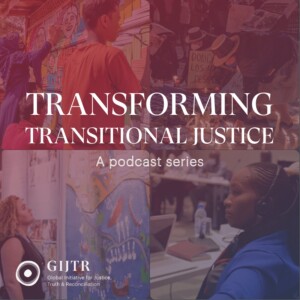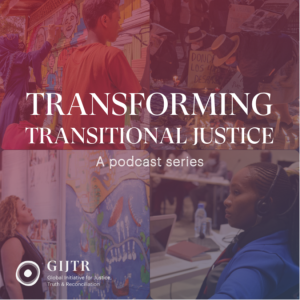Transforming Transitional Justice
”Transforming Transitional Justice” is a podcast from the Global Initiative for Justice, Truth and Reconciliation, a flagship program of the International Coalition of Sites of Conscience, a global network of historic sites, museums and memory initiatives that support communities to confront painful pasts in order to establish more just and peaceful societies today.
Episodes

Thursday Jul 18, 2024
Thursday Jul 18, 2024
Welcome to the final episode of Transforming Transitional Justice, a podcast from the Global Initiative for Justice, Truth and Reconciliation, a flagship program of the International Coalition of Sites of Conscience, a global network of historic sites, museums and memory initiatives that support communities to confront painful pasts in order to establish more just and peaceful societies today.
Today we'll be diving into the many challenges still facing victims and survivors of atrocity as well as how the international community can help them better navigate these obstacles. In particular, we will explore the many ways that reparations can - when made available - provide concrete assistance to survivors. We’ll also examine how international entities can better support community-led transitional justice efforts.
We're grateful to all of our guests and contributors throughout this series who have reminded us that only by amplifying the voices of survivors can we inspire collective action and true change in countries struggling to confront human rights violations.
VISIT: www.gijtr.org to learn more
Guests on this episode include:
Deborah Ruiz Verduzco, the Executive Director of the Trust Fund for Victims at the International Criminal Court.
Muhammed Sandeng, an activist and son of the late Solo Sandeng who was tortured and killed in detention during Yahya Jammeh’s rule in The Gambia. Along with his sister, Fatoumatta, Muhammed is the co-founder of the Solo Sandeng Foundation.

Tuesday Jul 02, 2024
Tuesday Jul 02, 2024
Welcome to the fifth episode of Transforming Transitional Justice, a podcast from the Global Initiative for Justice, Truth and Reconciliation, a flagship program of the International Coalition of Sites of Conscience, a global network of historic sites, museums and memory initiatives that support communities to confront painful pasts in order to establish more just and peaceful societies today.
What does justice look like for a survivor of human rights violations? How can civil society actors partner with victims to fight for and achieve accountability? Finally, what systems can be put in place to support violence prevention efforts, so that cycles of trauma do not keep repeating themselves?
To help us understand these questions through GIJTR’s specific lens, we’re delighted to welcome today two activists from Guinea and The Gambia in West Africa, two countries that have undergone tremendous pain at the hands of dictators or military rulers, and – to varying degrees – emerged from these periods with some traditional, formal justice and accountability mechanisms, as well as ones that address survivors’ long-lasting needs in more informal ways.
VISIT: www.gijtr.org to learn more
Guests on this episode include:
Asmaou Diallo, president of the association of victims and parents of the 28th of September Massacre in Guinea, or AVIPA.
Sawyatou Bangura, the Senior Human Rights Project Officer of ANEKED, The African Network against Extrajudicial Killings and Enforced Disappearances, Gambia chapter.

Tuesday Jun 18, 2024
Tuesday Jun 18, 2024
Welcome to the fourth episode of Transforming Transitional Justice, a podcast from the Global Initiative for Justice, Truth and Reconciliation, a flagship program of the International Coalition of Sites of Conscience, a global network of historic sites, museums and memory initiatives that support communities to confront painful pasts in order to establish more just and peaceful societies today.
Documentation is crucial to protecting human rights and the pursuit of justice. When formal accounts of violations and atrocities are not recorded and preserved the experiences of victims and survivors are left unacknowledged and unaccounted for. Without a clear record of the crimes committed, perpetrators enjoy impunity, and the pain of survivors is needlessly exacerbated and societies are robbed of valuable lessons for creating more just and peaceful futures.
Our expert guests guide us through different conflict and post-conflict situations around the world and how documentation (and especially the role of locally led initiatives) is absolutely vital to healing, reconciliation, and justice.
VISIT: www.gijtr.org to learn more Guests on this episode include:
Cynthia Ibale, a GIJTR partner and Senior Lawyer at Project Expedite Justice, with a focus on Sudan.
Dario Colmenares Millán, a Program Director for GIJTR, providing direct support in Columbia, Myanmar, and Bangladesh.

Thursday May 09, 2024
Thursday May 09, 2024
Welcome to the third episode of Transforming Transitional Justice, a podcast from the Global Initiative for Justice, Truth and Reconciliation, a flagship program of the International Coalition of Sites of Conscience, a global network of historic sites, museums and memory initiatives that support communities to confront painful pasts in order to establish more just and peaceful societies today.
Families are often sidelined in national searches for the disappeared in post-conflict settings. There are all too many cases where victims’ families have been excluded from the process and apprised of only some, if any, of the findings. And yet locating and identifying Missing and Disappeared Persons lost in conflict is a central component of transitional justice processes across the globe, and particularly in the global South.
In this episode we will discuss the unique opportunities for healing, accountability, and justice offered by forensic technologies. The emotional burden, for both practitioners and families, is immense, and it is important to understand how to delicately work through these painful emotions. The sense of closure and relief offered to families' is immeasurable, making forensic technology an absolutely vital tool in post-conflict healing and reconstruction.
VISIT: www.gijtr.org to learn more
Guests on this episode include:
Fredy Peccerelli, the Executive Director of the The Forensic Anthropology Foundation of Guatemala.
Cindy Mansour. a doctoral student in forensic anthropology from Beirut, Lebanon, and a forensic researcher at Act for the Disappeared.

Thursday Apr 25, 2024
Thursday Apr 25, 2024
Welcome to the second episode of Transforming Transitional Justice, a podcast from the Global Initiative for Justice, Truth and Reconciliation, a flagship program of the International Coalition of Sites of Conscience, a global network of historic sites, museums and memory initiatives that support communities to confront painful pasts in order to establish more just and peaceful societies today.
Each episode of the podcast focuses on common issues that post-conflict communities face - from helping victims heal from conflict-related sexual violence and bolstering communities' ability to search for their missing to documenting violations. We'll explore these issues through GIJTR's unique, survivor-centered lens.
In this episode, we explore the complex process of healing after conflict related sexual violence. Despite the many conflicts fought around the globe in the last century, it was not until the 1990s that the prevalence of sexual violence during them began to be addressed. Some attribute this to the powerful testimonies of survivors given during the international criminal tribunals for Rwanda and the former Yugoslavia, which made it all too clear that sexual violence - long seen as a byproduct of war - was in fact a deliberate strategy used to fracture the social fabric of communities.
Our guests guide us through the realities of conflict-related sexual violence, the importance of locally led, compassionate care, and share ways that transitional justice mechanisms can better help societies and individuals begin to heal from such trauma.
VISIT: www.gijtr.org to learn more
Guests include:
Sarah Case, a deputy program director of the Global Initiative for Justice, Truth, and Reconciliation, who has worked with survivors of sexual violence in multiple contexts, including Colombia, Ukraine, Nepal, and Cambodia.
Fatou Baldeh, the founder of Women in Liberation and Leadership, or WILL, a local GIJTR partner in The Gambia that works to support victims of sexual and gender-based violence in the country.
Bibiana Pinaranda Sepulveda, a Colombian activist and participant in a GIJTR project focusing on the reintegration of women victims of conflict-related sexual violence and children born of war.

Thursday Apr 11, 2024
Thursday Apr 11, 2024
Welcome to the first episode of Transforming Transitional Justice, a podcast from the Global Initiative for Justice, Truth and Reconciliation, a flagship program of the International Coalition of Sites of Conscience, a global network of historic sites, museums and memory initiatives that support communities to confront painful pasts in order to establish more just and peaceful societies today.
Each episode will focus on common issues that post-conflict communities face - from helping victims heal from conflict-related sexual violence and bolstering communities' ability to search for their missing to documenting violations. We'll explore these issues through GIJTR's unique, survivor-centered lens.
In this first episode, we're going to lay the groundwork, establishing exactly what transitional justice is, how previous models have given survivors short shrift, and how new ones can center survivors and create spaces for them to lead.
Please note views expressed by non-U.S. Government employees in this episode do not represent the views nor should be seen as endorsed by the U.S. Government.
VISIT: www.gijtr.org to learn more
Guests Include:
Ereshnee Naidu-Silverman, the Senior Director for the Global Transitional Justice Initiative, the Coalition’s flagship program on transitional justice.
Dr. Patricia Davis, a director of the Bureau of Democracy, Human Rights and Labor (DRL) Office of Global Programs
Annah Moyo, Executive Director at CSVR
Brahmy Poologasingham, the Senior Technical Advisor and Lead of Transitional Justice & Accountability Programs at the Department of State’s Bureau of Democracy, Human Rights and Labor

Sunday Mar 17, 2024






